Fatal
Fury: King of Fighters
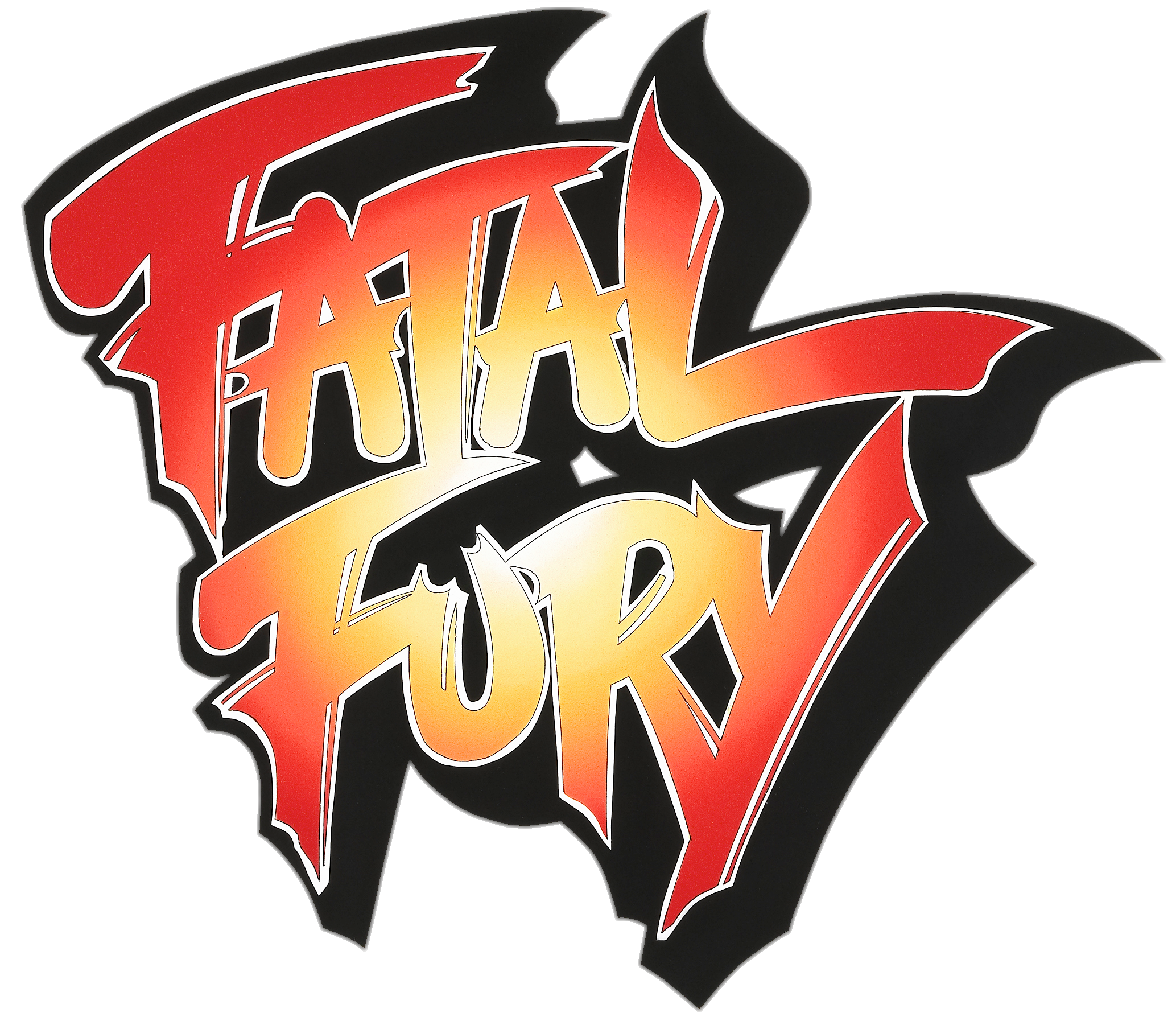
STORY:
A martial arts tournament known as the
"King of Fighters" tournament, is being held in the fictional American
city of South Town and sponsored by local crime boss Geese Howard. Ten years
prior to the events of the game, Geese murdered a rival martial artist named
Jeff Bogard who was on his trail. Now, Jeff's sons, Terry and Andy, along with
their friend Joe, enter the tournament to get revenge on Geese.
|
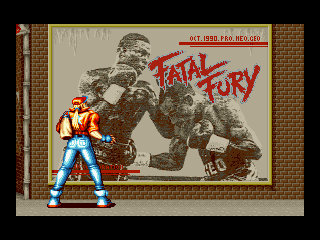
|
|
Terry
Bogard... the hero of Fatal Fury / Garou series.
|
REVIEW:
Known in Japan as Garou Densetsu, which literally translates to "The Legend of the Hungry Wolf," Fatal Fury was SNK's
answer to Capcom's wildly successful new 2D fighter
Street Fighter II: The World Warrior
(released in February 1991). In Fatal Fury: King of Fighters (which you might refer to as Fatal Fury 1), the player takes control of one of three heroes (Terry, Andy, or Joe) fighting their way through the tournament circuit. The first four CPU opponents are Richard
Meyer, Duck
King, Tung Fue Rue, and Michael Max. Players can select the order of their
opponents —
a unique attribute to Fatal Fury over other fighting games of the time. After defeating the
first 4 opponents, the player will then face off against Hwa Jai, Raiden, and Billy Kane (in that order) before encountering the
final boss,
Geese Howard.
 FUN FACT:
Fatal Fury was not the original title during this game's early development. The
earliest version of the game was titled "Real Bout" - confirmed by SNK's Youchiro Soeda. The words "Real Bout" can even be seen in many stage backgrounds on billboards and signs. About 4 or 5 years after the launch of Fatal Fury, a reboot of the series with a new art style called Real Bout (1995) was released.
FUN FACT:
Fatal Fury was not the original title during this game's early development. The
earliest version of the game was titled "Real Bout" - confirmed by SNK's Youchiro Soeda. The words "Real Bout" can even be seen in many stage backgrounds on billboards and signs. About 4 or 5 years after the launch of Fatal Fury, a reboot of the series with a new art style called Real Bout (1995) was released.
|
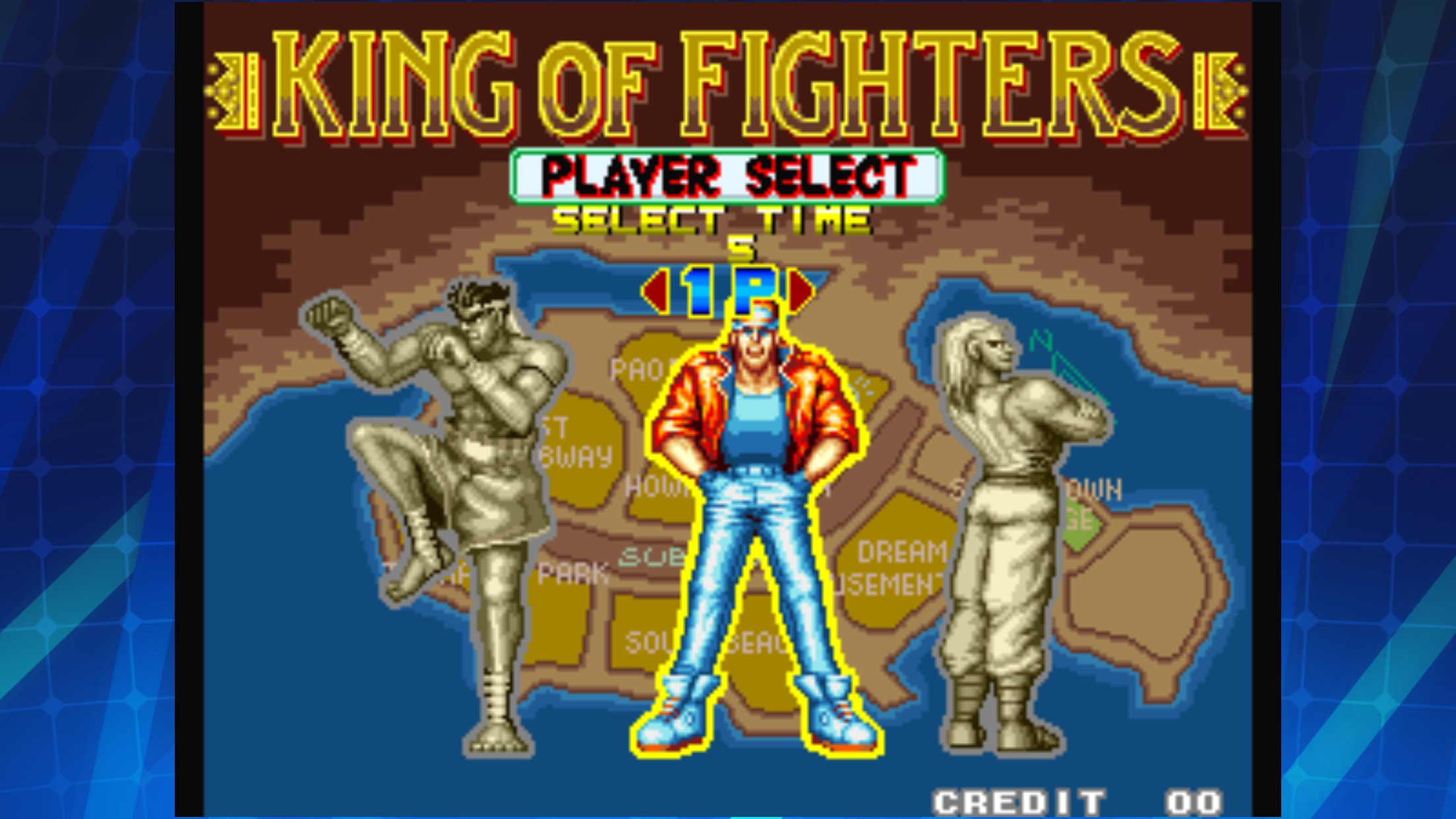
|
|
Fatal
Fury 1 character selection screen... Only 3!
|
Unlike Street Fighter 2, the story of Fatal Fury was a prominent aspect of the game. The player would see several cutscenes while playing through arcade mode, most which hype up the oncoming encounter with big boss Geese Howard. Fatal Fury 1 also features a bonus arcade arm-wrestling
Mini Game between rounds, comparable to the likes of Street
Fighter 2's barrels and car bonus modes.
Fatal Fury characters can move around a bit
"differently" than those from the likes of Street Fighter. One of Fatal Fury's
distinguishing gameplay systems is the Line System —
enabling the ability for characters to jump into the background
or foreground and continue fighting. During a Line Switch, characters appear
smaller as they jump into the background and larger and clearer in the foreground.
This unorthodox gameplay element and visual effect set Fatal Fury apart from other 2D fighting games...
for better or worse.
|
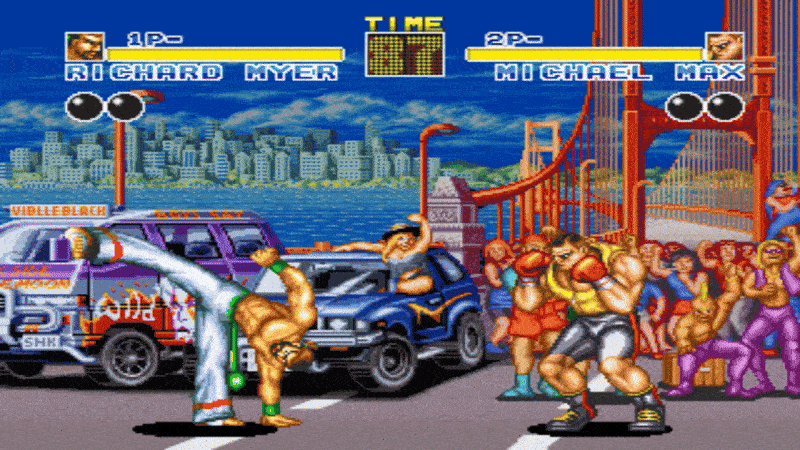
|
|
Before
Eddy Gordo there was Richard Myer (Meyer).
|
Considering how SNK used the 2D sprites, this "3D effect" was pretty innovative and also graphical achievement and enabled SNK to soon distinguish themselves in the fighting genre (as other SNK fighting games used similar visual effects).
Other unique elements to 2D fighting games? Fatal Fury also allowed both 1P and 2P to fight together against a CPU
AI. This idea was certainly innovative and an impressive visual feat for an
arcade video game at the time, but SNK decided it didn't quite do justice to the "heroes" of the game (and seemed like a cowardly
thing that heroes shouldn't do)... so they removed this feature in later
installments.
|
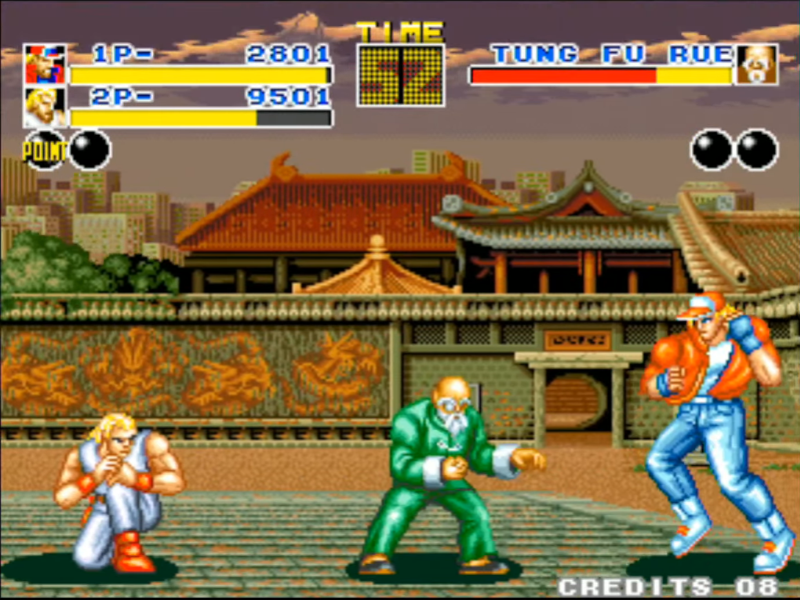
|
|
Two
versus one! The Bogard Bros. take on Tung Fu Rue.
|
In my eyes, the original Fatal Fury
was an interesting "alternative"
to Street Fighter 2 (perhaps to collect some of the overflow players who lost their quarters / tokens over at the highly-populated SF2 machines.)  There's no denying SF2 was more playable long-term due to its complexity and it being more technically sound for competition. There's no denying SF2 was more playable long-term due to its complexity and it being more technically sound for competition.
Little did we know in 1991, Fatal
Fury still placed some of the groundwork of what would become one of the most iconic 2D fighting game franchises of all time —
and one that would introduce many memorable characters, including those who eventually joined many other fighting game franchises and iconic crossovers.
|
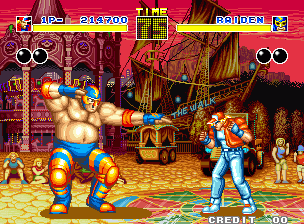
|
|
Raiden was an
impressively large 2D sprite for 1991.
|
I think the weakest part of Fatal Fury 1 was its actual gameplay, which wasn't anywhere near as responsive or playable as Street Fighter II's engine. (Not to mention, only 3 playable characters.) At the very least, Fatal Fury 1's "Line System" laid the groundwork for the mechanic
being used in several future installments. Fatal Fury's original roster was memorable for the most part, although several opponent-only characters definitely lacked personality and flash (especially when compared to their competition at camp Capcom).
Indeed, many Fatal Fury characters were rough around the edges in the beginning, but thankfully, later developed further in future SNK fighting games. Over the decades, Terry Bogard and company have certainly come a long way from the first game. Overall, Fatal Fury 1 made a name for itself thanks to its innovative gameplay, focus on story, and
memorable heroes.
|
|

| Page Updated: |
February
3rd, 2026
|
| Developer(s): |
SNK, Takara |
| Publisher(s): |
SNK |
| Platform(s): |
NeoGeo, NeoGeo CD, Sega Genesis,
Super Nintendo, PlayStation 2, Nintendo Wii Virtual Console, PSN
|
| Release Date(s): |
Nov. 25th, 1991
Arcade
Dec. 20th, 1991
Neo Geo
Nov. 27th, 1992
 SNES SNES
April 1992
 SNES SNES
Apr. 23rd, 1993
 Genesis Genesis
Sept. 9th, 1994
Neo Geo CD
Sept. 21st, 2007
 Wii VC Wii VC
Oct. 8th, 2007
 Wii VC Wii VC
Dec. 21st, 2010
PSN |
| Characters: |
Terry
Bogard,
Andy Bogard,
Joe Higashi,
Richard Meyer, Duck King, Tung
Fue Rue, Michael Max,
Hwa
Jai, Raiden,
Billy
Kane, Geese Howard |
| News
Links: |
Apr.
2025: Fatal Fury: COTW Special Animation by Masami Obari |
|
|
|
Featured Video:
|
|
|
| Related Games: |
Street Smart, Fatal
Fury 2, Fatal Fury 3, Fatal
Fury Special, Real Bout Fatal Fury, Real Bout
Fatal Fury
Special, Real Bout Special: DM, Real Bout Fatal Fury 2, Fatal Fury: Wild Ambition,
Fatal
Fury: 1st Contact, Garou: Mark of The Wolves, Fatal
Fury: City of the Wolves, International Karate,
Yie Ar Kung Fu, Street Fighter, Street Fighter 2,
Art of Fighting, Samurai Shodown,
The King of Fighters '94,
KOF '95,
KOF '96, Capcom Vs. SNK,
CVS: Pro,
Capcom Vs. SNK 2,
SNK Vs. Capcom: MOTM,
SNK Vs. Capcom Chaos |
|

|
|
Gameplay
Engine
|
6.0 / 10
|
|
Story
/ Theme
|
7.0 / 10
|
|
Overall
Graphics
|
7.5 / 10
|
|
Animation
|
6.5 / 10
|
|
Music
/ Sound Effects
|
6.0 / 10
|
|
Innovation
|
6.5 / 10
|
|
Art Direction
|
7.0 / 10
|
|
Intro / Presentation
|
7.0 / 10
|
|
Replayability / Fun
|
6.0 / 10
|
|
"Ouch" Factor
|
6.0 / 10
|
|
Characters
|
6.0 / 10
|
|
BOTTOM LINE
|
6.3
/
10
|
|
Review based on Arcade
version
|
|
| Final
Words: |
SNK deserves credit for thinking outside the box and focusing more on character storylines, but let's be honest... Fatal
Fury wasn't a "great" fighting game at its core. There's a reason Street Fighter 2 was a competitive smash hit and Fatal Fury was not. In fairness, not many other games could really compete with SF2 at the time (that's how crazy good that game was). However, Fatal Fury 1
almost seemed like it was competing more with SF1 —
and it is indubitably better than that game, no question!  But, real talk: SF2 was already out for months before Fatal
Fury 1 hit arcades, and Capcom didn't take long to update their game with
hugely-popular CE and
Turbo versions. But, real talk: SF2 was already out for months before Fatal
Fury 1 hit arcades, and Capcom didn't take long to update their game with
hugely-popular CE and
Turbo versions.
After Fatal Fury 1, SNK went in a different direction to stay competitive, releasing two other highly-compelling 2D franchises:
Art of Fighting and
Samurai Shodown —
both of which were vastly impressive and influential in the fighting genre!
Also worth mentioning, SNK decided to completely redraw all characters and change the engine almost entirely for
Fatal Fury 2 (another divergent from Capcom's formula). This trend would continue with the series in several installments, with a mix of new and past gameplay systems. All this to say, SNK definitely a long way from scrapping together Fatal
Fury 1's logo — also basically a complete rip-off of SF2's.  (Same color scheme and everything.) (Same color scheme and everything.)
Fatal Fury would eventually lose "The King of Fighters" part of its title, which
as you probably know, became its own long-running series with decades of sequels. Needless to say, Fatal Fury was an influential and important stepping stone in SNK
history... truly a monumental one that would pave the way for countless other hit 2D fighting games by SNK — many that still to this day feature characters from Fatal Fury 1. Most importantly, Fatal Fury's characters eventually developed to incredible new levels of personality in later sequels to the franchise,
as well as genre-defining SNK (and Capcom-developed) crossover games such as
Capcom Vs. SNK.
~TFG
Webmaster | @Fighters_Gen
|
|
|
|
|
|
|
|
|
|
|
|
|
|
|